
Willows, also called sallows and osiers, of the genus Salix, comprise around 350 species of typically deciduous trees and shrubs, found primarily on moist soils in cold and temperate regions.

Salix alba, the white willow, is a species of willow native to Europe and western and central Asia. The name derives from the white tone to the undersides of the leaves.

Salix caprea, known as goat willow, pussy willow or great sallow, is a common species of willow native to Europe and western and central Asia.

Salix × fragilis, with the common names crack willow and brittle willow, is a hybrid species of willow native to Europe and Western Asia. It is native to riparian habitats, usually found growing beside rivers and streams, and in marshes and water meadow channels. It is a hybrid between Salix euxina and Salix alba, and is very variable, with forms linking both parents.
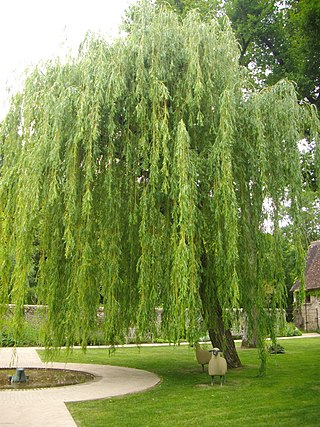
Salix babylonica is a species of willow native to dry areas of northern China, but cultivated for millennia elsewhere in Asia, being traded along the Silk Road to southwest Asia and Europe.

Salix cinerea is a species of willow native to Europe and western Asia.

Salix nigra, the black willow, is a species of willow native to a large portion of North America, from New Brunswick and southern Ontario west to Arizona and California, and south to northern Florida and Texas.
Salix serissaefolia is a putative species of willow native to central Japan. It is known as コゴメヤナギ in Japanese. It was described by Kimura in Bot. Mag. Tokyo40: 639 (1926). H.Ohashi synonymized it as Salix jessoesis subsp. serissaefolia (Kimura) H. Ohashi, comb. nov., in A Systematic Enumeration of Japanese Salix (Salicaceae), Hiroyoshi OHASHI 植物研究雑誌 J. Jpn. Bot.75: 1-4 1 (2000). Note the typographical error for Salix jessoensis. Salix jessoensis is a synonym of Salix pierotii, as is Salix serissifolia. Note the spelling difference between Salix serissaefolia and Salix serissifolia.

Salix integra is a species of willow native to north-eastern China, Japan, Korea and the far south-eastern Russia.

Salix koriyanagi is a species of willow native to the Korean Peninsula, and introduced to Japan. It can reach a height of 4 m (13 ft).
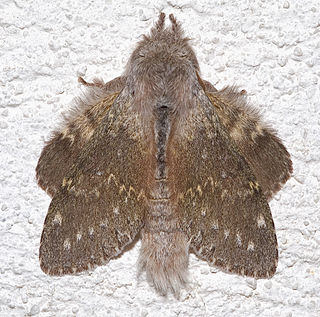
The lobster moth, also known as lobster prominent, is a moth from the family Notodontidae. The species was first described by Carl Linnaeus in his 10th edition of Systema Naturae. The English name refers to the crustacean-like appearance of the caterpillar.

Salix OS is a multi-purpose Linux distribution based on Slackware.
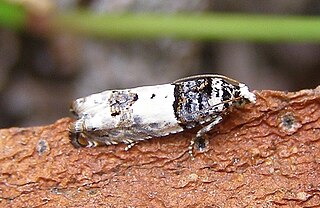
Gypsonoma sociana is a moth of the family Tortricidae. It is found from Europe to Russia, China and Japan.

Leucoptera sinuella is a moth in the Lyonetiidae family. It is found in most of Europe, except Ireland, the Balkan Peninsula and the Mediterranean Islands. It is also found in Japan and North Africa.

Phyllonorycter pastorella is a moth of the family Gracillariidae. It is known from all of Europe, east to Russia, China and Japan.
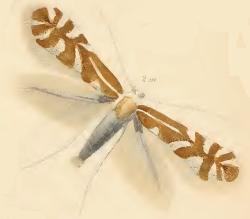
Phyllonorycter salicicolella is a moth of the family Gracillariidae. It is known from all of Europe, east to Russia and Japan.
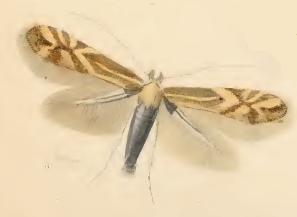
Phyllonorycter salictella is a moth of the family Gracillariidae. It is known from all of Europe, east to Russia and Japan.
Caloptilia chrysolampra is a moth of the family Gracillariidae. It is known from China, Japan, Korea and Taiwan.

Parastichtis suspecta, the suspected, is a species of moth in the family Noctuidae. It is found from most of Europe through Russia and east through the Palearctic to Japan. It is also found in North America.
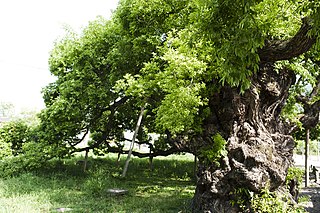
Salix pierotii, the Korean willow, is a species of willow native to northeast China, far eastern Russia, the Korean peninsula and Japan. They are shrubs or trees reaching 8 m. Because their twisted wood is not good for timber or making tools, in Japan Salix pierotii trees are used to demarcate property lines between farms.

















